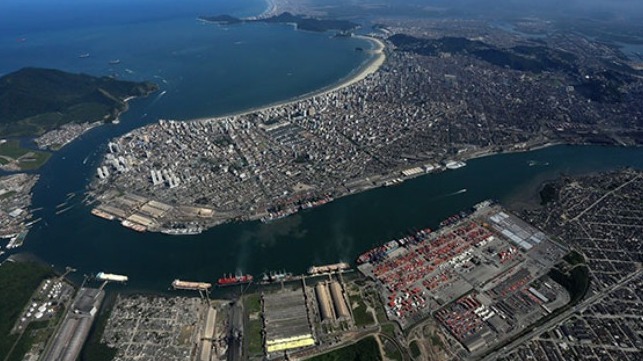Brazil Gets $2 Billion in Private Commitments to Modernize Ports

Brazil has secured agreements calling for approximately $2 billion in private investments to expand six of the country’s ports. It is the latest in a series of steps the government is taking to modernize port operations and expand the capabilities of the country’s seaports through privatization.
The Ministry of Infrastructure entered into agreements for the construction of new terminals, in greenfield areas, in the ports of Santos, Santarém, Paranaguá, Manaus, and Ponta de Pedras. The projects will expand the range of services and the storage capacity of solid, liquid, and gaseous bulk, general, and containerized cargo. During a signing ceremony, the minister said these projects would create greater competitiveness for Brazilian trade in the international market. In addition, they will be new alternatives for logistics chains, increasing competition and, potentially, reducing operating costs.
“Ports have become part of the solution to Brazil's problems,” said National Secretary of Ports and Waterway Transport, Mário Povia. “We are delivering efficient logistics to the port sector, thanks to the modern legislation we have today and the trust of the private sector.”
Among the companies entering into the agreements for the port development projects is the Brazilian division of France’s Louis Dreyfus Company, a leading agriculture, food processing, international shipping, and finance group. Other companies participating in the privatization efforts for the ports include Logistics Port Terminal, Brazilian Company of Terminals and General Warehouses, Atem's Oil Distributor, Logistic Slabs, and Porto Guará Infrastructure.

that matters most
Get the latest maritime news delivered to your inbox daily.
Minister of Infrastructure, Marcelo Sampaio, highlighted that the government has now completed 138 privatization contracts since 2019. He said the investments slated for the ports will make them more modern and productive, creating greater efficiency for the entire supply chain.
The privatization of the ports is part of a broader strategy being implemented by the government designed to attract corporations to participate in enhancing Brazil’s infrastructure including the railways, airports, and highways, as well as the ports. The hope is that by offering concessions in which companies pay the government a fee to operate the facilities and commit to large investments to enhance the infrastructure Brazil will spur its lagging economy. The Financial Times reported that Brazil could secure more than $50 billion in commitments for 100 infrastructure projects by the end of 2022.
